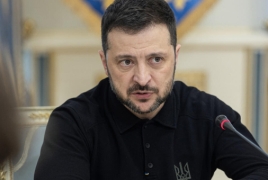
Ukrainian President Volodymyr Zelensky has firmly stated that Ukraine will not accept any peace agreement formulated by the United States and Russia without Ukraine's direct involvement. This declaration follows discussions between U.S. President Donald Trump and Russian President Vladimir Putin regarding potential ways to end the ongoing war.
"We, as a sovereign country, simply will not be able to accept any agreements without us," Zelensky said.
President Trump, after a phone conversation with President Putin, described the possibility of peace as a "good opportunity" and noted that Ukraine's NATO membership is "not realistic," while the idea of returning to pre-invasion borders is "unlikely."
Trump mentioned that Russian officials are scheduled to meet with Americans in Munich on February 14 during a security conference. "Ukraine was also invited, by the way. I don't know who will be there from which country, but there will be high-level officials from Russia, Ukraine, and the United States. I would like them [the Russians] to return. I think it was a mistake to push them out. It's not about whether we like Russia or not," Trump stated.
When asked if he trusts Putin, Trump responded, "I believe that he would like to see something happen. I trust him on this subject."
Russia, which is not officially participating in the annual security conference, has not immediately responded to Trump's statement. Meanwhile, Zelensky's advisor, Dmytro Litvin, denied that Ukraine plans to hold talks with the Russians in Munich, stating that such discussions "are not planned."
Zelensky is expected to meet with U.S. Vice President J.D. Vance in Munich.
Reports indicate that after three years of ongoing war, many Ukrainians are weary and willing to make certain concessions for the sake of peace. Additionally, some Ukrainians are disappointed with the policies of President Joe Biden's administration. Despite promises to support Ukraine in fully restoring its territories, delays in military aid have allowed Russian forces to regroup.
Trump's approach is, at least, more transparent regarding the limitations of U.S. support, noted Tymofiy Mylovanov, president of the Kyiv School of Economics.
Meanwhile, French President Emmanuel Macron has stated that establishing peace in Ukraine should not come at the cost of "capitulation," as such a development would be dangerous not only for Ukraine but for the entire international community, including the United States.
"The only question at this point is whether President Putin is truly, sustainably, and reliably ready for a ceasefire agreement. After that, it is up to the Ukrainians to negotiate with Russia," Macron said during a speech at the Élysée Palace.
Macron insisted that only Zelensky can negotiate on behalf of Ukraine, stating, "A peace based on capitulation would be bad news for everyone."
Macron noted that Trump has created a "window of opportunity" for negotiations but emphasized that "everyone must play their part." He stressed that while Zelensky should decide on Ukraine's territorial and sovereignty issues, the international community, especially Europe, must take on a role in providing long-term security guarantees in the region.
The Financial Times added that Macron views Trump's political return as a pivotal moment that should compel Europe to take responsibility for its own security and the future of Ukraine.

